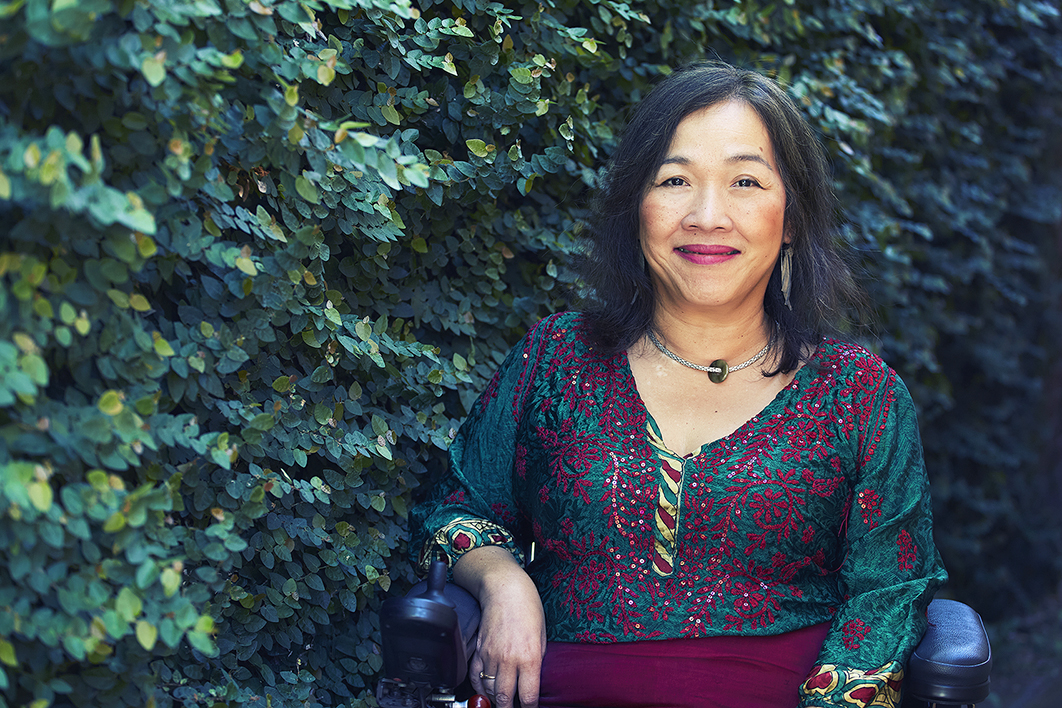“Life is normal,” writes Micheline Lee. “At least it feels normal, until I see people’s eyes on me and feel their pity, their admiration that I go on living, their horror or their thankfulness that they are not me.”
Lee is a novelist, painter and human rights lawyer. Her debut novel The Healing Party was shortlisted for several prizes, including the Victorian Premier’s Literary Award.
Born with spinal muscular atrophy and using a wheelchair, she is also the author of the latest Quarterly Essay, Lifeboat: Disability, Humanity and the NDIS. Of all the millions of words written about the National Disability Insurance Scheme, few have been as incisive as these, bringing to us the dimensions of her lived experience.
The NDIS has transformed the lives of tens of thousands of people — something that Lee acknowledges. “For those who can access the scheme and turn funds into the support they need,” she writes, “the NDIS is, as many have said, life-changing.” Without the NDIS, “I wouldn’t be able to pay for the support workers I need to live independently in my home.”
But she also argues that it has not lived up to expectations. The activists who fought for reform for many years focused on three principles: that a new scheme had to be based on rights; that those with disability should be able to decide themselves the supports they need; and that these supports should enable them to participate on an equal basis in economic, social and cultural life.
The NDIS’s design means it delivers these goals in theory but compromises them in practice.
Many have been unable to exercise choice or real management of their supports, Lee writes. She describes the process of drawing up an NDIS plan as “notoriously disempowering,” with processes hard to navigate and the planners who assist likely to change every year.
On one occasion she was told that her funding would be reduced as she became better or more independent, in line with the goals of the NDIS. Lee explained that her condition was progressive and she was likely to need more supports in the future rather than fewer. “You’re talking to a real person,” she told her planner, “not someone who has to fit into one of your boxes.” Her plan was reduced anyway.
The market-based approach that underlies the NDIS and the light-touch regulation that accompanies it means the government and the National Disability Insurance Agency, or NDIA, which administers the scheme, often have little knowledge of the scheme’s impact on individuals. Lee cites cases of private providers refusing to take on people who display challenging behaviours — people who have no government service to fall back on.
Her critique echoes that of Mark Considine, whose book The Careless State cites numerous examples of the failure of Australia’s privatised and deregulated social policy system, including the NDIS. Rather than competition among private providers making services cheaper and better, she writes, the opposite is the case. “Once they know you are on the NDIS, many providers will charge the maximum rate allowable under the scheme.”
The scheme also has had perverse effects, such as the assumption by society that it means those with a disability always have their own help. Flying to Byron Bay for the writers’ festival, where she would meet a support worker, Lee decided not to arrange for a separate support worker on the flight, which she estimated would have involved about fourteen hours of paid time, including the flight back.
But she could find only one airline that would allow her to travel alone. At security, where in the past staff had always helped her, she was asked where her carer was and had to rely on a friendly woman in the queue to lift her bag on to the belt. She was asked the same question at the boarding gate and by the flight attendant. “The NDIS has helped to minimise the individual effects of my condition but it has not helped make society more accessible,” writes Lee.
Nor has it led to a more inclusive society in other respects, a point also highlighted by last week’s report of the disability royal commission. Lee explained to her long-time friend Frida, who had a mental health condition, how the NDIS might be able to help her get back to work. “Yeah sure, but what can they do if no one wants to give me a job?” Frida replied. A new client rejected Lee, who works as a lawyer, as soon as he saw her. “He told the manager that he needed a lawyer who would look the part in court.”
According to the NDIA, 20 per cent of NDIS participants had a job in 2020, with another 31 per cent saying they were unemployed but wanted work. “We are disabled by society as well as by our bodies,” writes Lee.
She charts her journey from when she was young and “disability was something I had to deny and overcome” to acceptance: “You can accept your disability. What is not acceptable is when the world treats you as second class and excludes you because of it.”
As a young woman, her fear of becoming increasingly disabled and dependent drove her to travel widely in Europe and Africa alone and without support. “I was spurred on to experience everything, not miss out, never miss out, no matter how hard it was. Paradoxically, by experiencing my own helplessness, I was able to discover my inherent worth and power.”
Many of the shortcomings mentioned by Lee have been acknowledged by Bill Shorten, the minister responsible for the NDIS. The review he has commissioned is due to report by the end of October. Lee is hopeful. “The tide is turning,” she writes. •
Lifeboat: Disability, Humanity and the NDIS
By Micheline Lee | Quarterly Essay | Black Inc. | $27.99 | 144 pages




